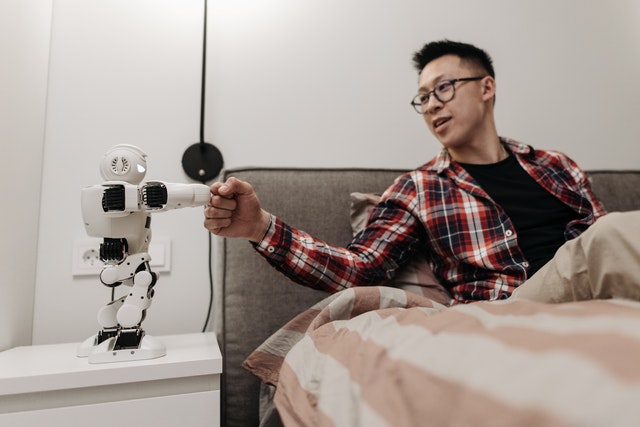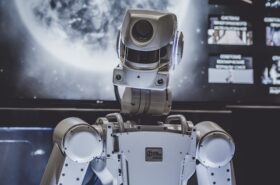
We’re all scared of AI replacing our jobs (if you’re not scared you’re naive ..or an AI engineer;). This article gives practical info about who will be affected most, and what you can do.
Artificial intelligence (AI) is among the revolutionary technologies that the world has seen in the last couple of years. AI is the ability of a computer or a robot controlled by a computer to do tasks that were initially done by humans. This has been made possible due to the drastic advancement in computing and the availability of huge amounts of data AI models can use to make better decisions.
Just a few years back, not so many people thought we would have semi-autonomous cars like we do today or proofreading assistants that help us to write and edit documents much faster. All these inventions have been possible because of artificial intelligence. However, there are millions of people whose livelihood relies on doing the tasks that these AI-powered tools are being created to do.

According to the Future of Jobs 2020 report by the World Economic Forum, over 85 million jobs will be lost by 2025 due to the increased adoption of Automation and AI. The reliability on technological tools to do work grew drastically during the covid19 pandemic when companies didn’t have the option of having all their employees physically show up at the workplace. This trend has continued even after the pandemic.
In this article, we will discuss some of the jobs that will likely be replaced by AI in the near future. But first, let’s find out why companies would want to replace humans with AI and automation tools.
What Can We Do To Avoid Being Unemployed by AI?
- Research Which Skills Are Useful In The Future
- Learn How To Use Software & AI Tools
- Practice Creativity in Your Work
- Build Human Relationships
- Be Flexible & Open-Minded With How You Work

Keeping your skills up to date is the number one protection you have against tech-related employment. Most people can stay employed by learning how to control the systems that affect these jobs. Specifically, this means working with AI & software, as well as continuously building your skills by learning how to use new software tools.
The Benefits of AI and Automation

Accuracy and precision

One of the major benefits of using machines over humans is that they do exactly what they are programmed to with a high degree of accuracy and precision. This reduces the time wasted and costs companies have to incur due to human-related errors. That is why companies now prefer machines in operations that require a high degree of accuracy and precision.
For instance, self-driving cars are relatively safer than human drivers because they take decisions based on available data and not emotions. Statistically, the crash rate of self-driving cars is almost half that of normal cars being driven by humans.
High productivity

Another crucial benefit of using AI-powered tools instead of humans is their high level of productivity. Computers do not get tired, so they can be deployed to work 24/7, without dropping their productivity. For instance, you can deploy chatbots to do some of your support tasks 24/7. These bots also get smarter the more data they are given, which further boosts their productivity in the long term.
So, businesses that use AI-powered tools can get more work done in less time as long as these tools have all the data they need to make the right decisions.
Lower costs

Another crucial reason that most business executives give for replacing humans with machines is the lower cost of managing machines. It is way cheaper to use an AI-powered tool to do certain tasks such as proofreading than to hire a full-time employee or freelancer. For example, you can use a tool like Google Translator to help you translate all the information sent to you in foreign languages instead of hiring someone to do such tasks as a full-time job.
AI tools can complement human resource

Even though AI tools are replacing a lot of human labor, most of these tools are used alongside a few humans. The most common example of this kind of scenario is with customer support services. Most of the help desk tools have integrated AI capabilities that can be utilized to automate responses to some of the most common queries that customers rise.
This in end allows the customer support team to focus on tasks that require human judgment and critical thinking. Automating most of the boring customer support tasks can significantly the productivity of the customer service team.
The jobs that will likely be replaced by AI
These are some of the jobs that will likely be replaced by AI tools in the next couple of years.
Accountants

Accounting departments will likely be shrunk thanks to the many AI-powered accounting tools that can do most of the tasks that accountants do. Some of the accounting tasks that can be done by AI include bookkeeping, tax preparation, payroll, forecasting, and Accounts payable and accounts receivable.
In most organizations, most of these tasks are currently being done by human accountants, but this could change as more and more AI capabilities get integrated into accounting software. Some of the best accounting software that is leveraging AI include FreshBooks, Zoho Books, QuickBooks, and AccountingEdge Pro.
The subscription fees for these tools are still pretty high if you want to get all the AI tools that they have. However, as the technology continues to get cheaper, we expect to see some drop in the prices. At that point, small businesses will find it unnecessary to hire many accountants to do work that can accurately be done by AI tools that are much cheaper and more productive.
Taxi and Uber drivers

Autonomous cars are one of the most interesting technologies that most of the big tech and automotive companies are working on. Almost every big automotive brand, including Ford, General Motors, Mercedes, and Volks Wagen has integrated some self-driving capabilities in their cars.
We currently don’t have fully-fledged autonomous cars on the road right now, but this future seems closer than ever before. We could see the first fully autonomous cars hit the road by 2030 according to analysts in the automotive and tech space. Having fully autonomous vehicles would render most of the Taxi and Uber drivers jobless.
Uber itself is actively involved in self-driving projects. Yes, they might have sold their self-driving unit to Aurora, but they still have huge hopes in self-driving tech. We could see a future where a fleet of self-driving cars run by Uber and other ride-sharing companies such as Lyft.
Customer service personnel

Customer support is a crucial department in almost every company because it is the body that actively interacts with the customers on behalf of the entire business. Most of the CRM and help desk tools used today have AI capabilities that can be utilized to take on some of the repetitive and tedious tasks that were previously done by humans.
These tools can now automatically respond to the popular questions that most customers ask, giving a chance for the support team to focus on tasks that require human judgment and critical thinking. As these tools get better, companies will start shrinking their customer support departments in order to cut costs.
Some small businesses could possibly integrate support with sales and marketing when we get to a point where CRM and helpdesk tools can do most of the tasks without the need for any human input.
Data entry and bookkeeping clerks

If your company deals with huge amounts of raw data, you might probably be hiring a full-time employee that manually inputs this data into applications such as Excel or Google Sheets. However, as more business applications integrate AI and automation capabilities into their software, we may no longer need to hire full-time employees to do data entry jobs.
For instance, if you are running an eCommerce website along with a physical store, all your sales revenue on both these platforms will automatically be integrated without the need of a human to input them manually. Most of the eCommerce platforms support extensions/plugins for accounting and bookkeeping apps that can be installed to import all of this data in real-time.
These tools can also represent all the sales and revenue data visually through graphs, making it easy for businessmen to make vital decisions. As AI gets better, these tools can now use previous data to make predictions of how the future of your business in terms of sales and revenue will look like based on the current market condition.
Market research analysts

Most companies hire market research analysts whose main role is to research, compile, and analyze information on products and market conditions to identify potential new markets, sales opportunities, and the most effective methods of marketing specified products. Small businesses usually hire market research analysts as contractors in order to avoid the costs of employing them on a full-time basis.
However, we now have market research software that can do some of the tasks currently being done by market research analysts. These tools have AI capabilities that enable them to use data availed to them to predict the future trend of the market. Attest is one of the popular tools that can be used for market research and analysis tasks.
The advantage of using AI-powered tools is that the more data you feed them, the more accurate they become at predicting the future. So, we will soon get to a point where these tools can do almost everything that a market research analyst does.
Security personnel

Security is one of those expenditures that most companies and individuals don’t compromise. Companies and individuals hire security guards to look over their properties on their behalf. However, some of these surveillance tasks can now be done by tools such as Amazon’s ring camera.
These cameras have sensors that are paired with robust AI systems to play the role of informing owners in case there is any noticeable incident at the properties that may need their attention. Having these kinds of tools at your property will significantly lower the number of security guards that you will need to look after your property.
Receptionists

A lot of work that is done by receptionists in office and hotel facilities can now be done by AI-powered tools. Several companies have already replaced their receptionists with AI tools such as Automated phones, scheduling, and touchscreen systems that can do all tasks a human receptionist can do.
All receptionist’s tasks, including greeting customers, answering calls, scheduling appointments, and more can now be done by intelligent computer systems. These tools are inexpensive and can be deployed 24/7, so it makes a lot of sense for companies that want to cut labor costs to choose AI over human receptionists.
Couriers and delivery people

These are being replaced by drones and robots designed to autonomously do deliveries without any human input. Drones use AI systems to navigate to their pre-determined locations while going past any possible collisions along the way. For instance, Amazon Prime ships over billions of items per year using their Prime service drones.
Besides Amazon, several other companies, including FedEx, UPS Flight Forward, DHL Parcelcopter, Wing, Matternet, Zipline, and Flytrex are already doing drone deliveries. Drone deliveries have already replaced thousands of employees in the supply chain that could have done these deliveries.
Retail salespeople

For many years, most of the big shopping centers, including supermarkets and car dealerships have always been operated by salespeople. However, several companies are now starting to democratize the shopping experience with features like self-checkout which allows customers to make payments without physically interacting with any salesperson.
Businesses that are using this model usually employ a few people to guide those that may find trouble using the self-checkout systems.
Final Thoughts
There are several other jobs (besides the ones we’ve shared) that could be lost as a result of advancements in AI. However, this doesn’t mean AI is not good for humanity since it is taking away our jobs. There are millions of jobs that have been created by AI. According to a 2020 report by the Word Economic Forum, there will be over 97 million jobs related to AI and automation by 2025.
This surpasses the 85 million jobs that AI could replace. So, if the current job you are doing falls under the jobs that could be replaced by automation and AI, it is best to start building skills that cannot be replicated by machines in the foreseeable future.



